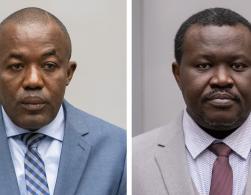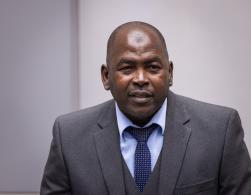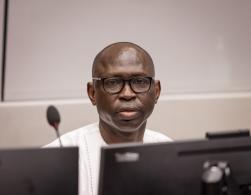Situation referred to the ICC by the CAR Government: May 2014
ICC investigations opened: September 2014
ICC investigations closed: 16 December 2022
Focus: Alleged war crimes and crimes against humanity committed in the context of renewed violence starting in 2012 in CAR. (See CAR I regarding the 2002/2003 conflict in CAR.)
Regional focus: Throughout CAR
Pre-Trial Chamber II
Judge Rosario Salvatore Aitala (Presiding Judge)Judge Sergio Gerardo Ugalde Godínez
Judge Haykel Ben Mahfoudh
DOCUMENTS
Jurisdiction in the general situation
On 3 October 2001, CAR ratified the Rome Statute and on 30 May 2014, it referred the situation in its territory since 1 August 2012 to the ICC. The ICC may exercise its jurisdiction over crimes listed in the Rome Statute committed on the territory of CAR or by its nationals from 1 July 2002 onwards, and in this specific situation is focussing on alleged crimes committed since 1 August 2012.
Context and alleged crimes
The ICC's investigation in CAR II focussed on alleged war crimes and crimes against humanity committed in the context of a conflict in CAR since 1 August 2012. The 2012 conflict reportedly involved alleged crimes by both Muslim Séléka and Christian anti-balaka groups; the violence allegedly led to thousands of deaths and left hundreds of thousands displaced. The UN has also issued warnings of the high risk of genocide in CAR.
In opening the investigation in September 2014, the Office of the Prosecutor issued a press release stating: "The information available provides a reasonable basis to believe that both the Séléka and the anti-balaka groups have committed crimes against humanity and war crimes including murder, rape, forced displacement, persecution, pillaging, attacks against humanitarian missions and the use of children under fifteen in combat. The list of atrocities is endless. I cannot ignore these alleged crimes."
The Prosecutor alleges that there is a reasonable basis to believe that the following crimes have been committed in CAR since 2012:
-
war crimes: murder, rape, pillaging, attacks against humanitarian missions, and the use of children under fifteen in combat; and
-
crimes against humanity: murder, rape, forced displacement, and persecution
On 16 December 2022, ICC Prosecutor Karim A. A. Khan KC announced the conclusion of the investigation phase in the situation in the Central African Republic II.
3
Cases
2
Ongoing Trials
5
Warrants of arrest
4
In custody
1
At large
Cases
The arrest warrant for Alfred Yekatom was issued on 11 November 2018 and unsealed on 17 November 2018. He was surrendered to the ICC on 17 November 2018 and appeared for the first time before Pre-Trial Chamber II on 23 November 2018. The arrest warrant for Patrice-Edouard Ngaïssona was issued on 7 December 2018. He was arrested by the authorities of the French Republic on 12 December 2018 and transferred to the ICC detention centre on 23 January 2019, upon completion of necessary national proceedings. His initial appearance before Pre-Trial Chamber II took place on 25 January 2019. On 20 February 2019, Pre-Trial Chamber II joined the Yekatom and Ngaïssona cases.
The confirmation of charges hearing was held on 19-25 September and 11 October 2019. On 11 December 2019, Pre-Trial Chamber II partially confirmed the charges of war crimes and crimes against humanity brought by the Prosecutor against Mr Yekatom and Mr Ngaïssona and committed them to trial. The public redacted version of the decision on the confirmation of charges was published on 20 December 2019.
On 11 March 2020, Pre-Trial Chamber II rejected the Prosecution's Request for Reconsideration of, or alternatively Leave to Appeal, the "Decision on the confirmation of charges against Alfred Yekatom and Patrice-Edouard Ngaissona", thereby concluding the proceedings in the case before that Chamber, and ordering the Registrar to transmit the Decision Confirming the Charges and the record of the proceedings to the ICC Presidency. This was done on 13 March 2020. On 16 March 2020, the Presidency constituted Trial Chamber V to be in charge of this case and is composed of Judge Bertram Schmitt, Judge Péter Kovács and Judge Chang-ho Chung.
The trial opened on 16 February 2021 before Trial Chamber V. The prosecution called 75 witnesses to testify. The Legal Representatives of Victims also called three witnesses to testify.
On 28 November 2023, the Defence for Mr Yekatom made its opening statement. The Defence for Mr Ngaïssona had already presented its opening statement at the beginning of trial.
Mr Yekatom and Mr Ngaïssona are in the Court's custody.
Next steps: On 11 December 2023, the first witness is scheduled to be called by the Defence.
The warrant of arrest against Mr Mahamat Said Abdel Kani also known as "Mahamat Said Abdel Kain" and "Mahamat Saïd Abdelkani" ("Mr Said") was issued under seal on 7 January 2019 for war crimes and crimes against humanity allegedly committed in Bangui (CAR) in 2013. Mr Said was surrendered to the ICC on 24 January 2021. The initial appearance of Mr Said before the Single Judge of Pre-Trial Chamber II, Judge Rosario Salvatore Aitala, took place on 28 and 29 January 2021. The confirmation of charges hearing took place from 12 to 14 October 2021.
On 9 December 2021, Pre-Trial Chamber II partially confirmed the charges of crimes against humanity and war crimes brought by the Prosecutor against Mr Said and committed him to trial.
Next steps: The trial opened on 26 September 2022 and is ongoing.
Warrant of Arrest for Mahamat Said Abdel
Decision on the confirmation of charges against Mahamat Said Abdel Kani
Charges withdrawn
The warrant of arrest against Maxime Jeoffroy Eli Mokom Gawaka was issued under seal on 10 December 2018 for war crimes and crimes against humanity allegedly committed in the Central African Republic. Mr Mokom was surrendered to the ICC on 14 March 2022.
On 22 March 2022, Maxime Jeoffroy Eli Mokom Gawaka made his first appearance before Pre-Trial Chamber II.
The confirmation of charges hearing commenced on 22 August 2023, but had not yet been concluded as the parties still had to submit written submissions on the merits of the case.
On 17 October 2023, Pre-Trial Chamber II terminated the proceedings in the Mokom case and ordered Mr Mokom’s immediate release. Mr. Mokom was released from the ICC detention on the same day. The Chamber acted on the basis of the Prosecution’s notice of withdrawal of the charges against Mr Mokom, dated 16 October 2023. This notice asserts that there are relevant changes regarding the evidence in the case. Therefore, the Prosecution considers that, even if the charges would be confirmed by Pre-Trial Chamber II, there is no reasonable prospect for a conviction at trial.



